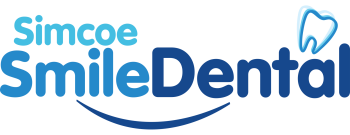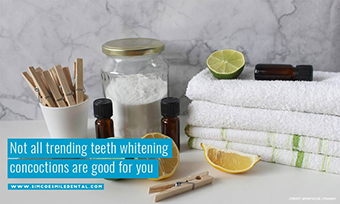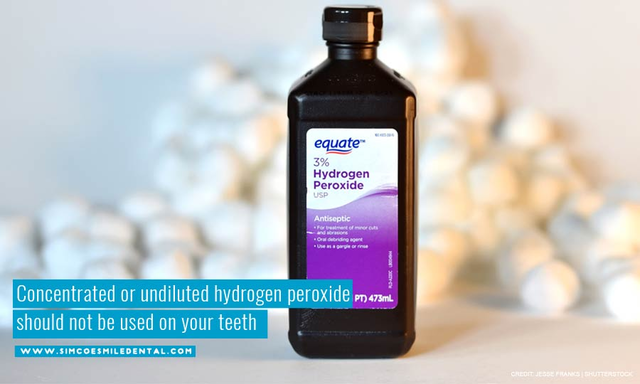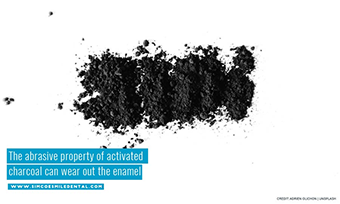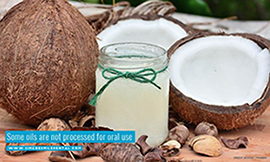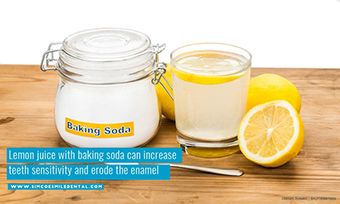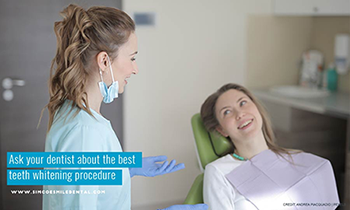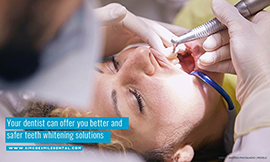One of the most coveted facial features is a brilliant white smile. Unfortunately, not everyone can have it. Yellow stains on the teeth can make it difficult for anyone to achieve that gorgeous bright smile. Because of this, one of the most popular trends to date is teeth whitening services.
In addition to in-office procedures, DIY treatments and homemade recipes have also gained momentum. From organic substances to industrial chemicals, it seems like every discovery can work wonders for your teeth. However, not every teeth whitening trend is safe for you. Here’s a quick rundown of the pros and cons of whitening trends.
4 Trending Whitening Methods to Be Careful Of
Going with the flow is not necessarily a good thing when it comes to cosmetic and health procedures. To answer the question, “Does teeth whitening damage your teeth?“ would have to depend on the type of treatment. Here are a few methods you need to be wary of:
1. Rinsing With Undiluted Hydrogen Peroxide
A common substance in emergency rooms and first aid kits, hydrogen peroxide is a potent antiseptic and great for cleaning wounds and cuts. Available in your local drug stores, it’s very affordable and convenient for use.
Its availability has inspired people to incorporate this chemical into their dental hygiene routine. Many say that gargling with it can whiten your teeth, ease a sore throat, mitigate the effects of gum disease, and reduce mouth sores. Some people even conclude that due to its antimicrobial properties, it can easily substitute toothpaste.
In low concentrations of not exceeding 3%, it can flush out the microbes and biofilm in your mouth. Its peroxide component also acts as a bleaching agent that can allegedly wipe off the stain from your teeth — but is hydrogen peroxide safe for teeth in the long run? Is it safe to gargle with undiluted hydrogen peroxide?
Risks
Anything used in excess is harmful and dangerous to your health. This is true even in the use of hydrogen peroxide. While it’s a great solution for wounds and surgical purposes, gargling undiluted hydrogen peroxide and accidentally swallowing it can lead to severe gastrointestinal problems.Its intense antimicrobial effects can also kill the good bacteria living in your mouth. Moreover, hydrogen peroxide vapours, when inhaled, may irritate your lungs, cause allergies, and affect your sinuses. A medical case in 2016 even recorded bouts of chemical colitis and gastritis due to hydrogen peroxide.
However, in small concentrations (diluted with water), it is a viable mouth whitening treatment. Just remember to keep it away from children and to ask advice from your dentist before attempting to use it orally.
2. Rubbing Teeth With Activated Charcoal
Activated charcoal has been used in traditional and organic medicine, it has been said to possess an array of health benefits. This decade surely brought it to the international spotlight, as it rose in popularity with the organic wellness craze. Its alleged effects on the human borders on the miraculous since it’s been said to cure an endless line of maladies.
It has been incorporated in cosmetic products, diet food, toothpaste, and more! And, one of its more popular uses is for teeth whitening. Its absorptive properties have been suggested to cleanse the body from toxins and prevent bad breath. However, is it also as effective when it comes to teeth whitening?
Produced from the burnt powders of wood, coconut shells, and organic substances, it is said to absorb stains, and its abrasive molecules are said to could scrub your teeth clean. However, for a teeth whitening product to work, it has to work on the deepest layer of stains, and there has been no scientific evidence that supports that activated charcoal has bleaching effects. With the lack of evidence, is activated charcoal bad for your teeth?
Risks
Too gritty and abrasive, activated charcoal molecules can severely damage your teeth. Using it regularly can wear out the enamel and expose the yellow tinted dentin of your teeth, causing increased tooth sensitivity. It also lacks the ability to remove the stains directly below your enamel and could stain cosmetic additions to your teeth such as your veneers, dentures, and fillings.
Some companies that sell activated charcoal in toothpaste don’t include fluoride (which is essential for cavity prevention) in the product. At the end of the day, activated charcoal is just too weak to remove actual stains, can wear out your teeth in the long run, and can cause unnecessary discoloration.
3. Oil Pulling
Oil pulling is a traditional Ayurvedic hygienic practice that is recently sweeping up the teeth whitening market of its feet. Originally used for stimulating saliva production and flushing out bacteria, this has also been said to allegedly remove stains from the teeth. Oil pulling is the act of gargling with any kind of organic oil in your mouth for oral hygiene purposes.
The oil used for this practice can range from coconut, sesame, sunflower, and olive oil. People like it because it is portable and can be used anywhere. The most popular oil variety being used is coconut oil that contains antibacterial lauric acid. Studies show that coconut oil itself reduces gingivitis inflammation, tooth decay, and removes plaque. However, there is little to no evidence that supports its ability to whiten teeth.
In addition, these studies were only applied to certain oil types and not to every kind. It is also important to note that its quality of being organically sourced can cause serious implications to one’s health when it is improperly processed.
Risks
Oil pulling is dangerous for individuals who are allergic and accidentally ingested it. Some oils in the market may not be completely filtered and clean from any contaminants, which could trigger plenty of bodily reactions. Its effect can range from a slight stomach ache to severe diarrhea.
People who have coconut allergy or sensitivity to these oil chemicals may suffer from severe reactions that could be fatal. Other observed side effects include a sore jaw, increased tooth sensitivity, and headaches due to the rigorous movement done by your facial muscles while oil pulling.
4. Brushing With Lemon Juice and Baking Soda
Baking soda is not only for your kitchens. Homeowners have used its bleaching ability to clean up stains in their toilets and countertops. However, this whitening effect does not stop there — people have tried incorporating it into their teeth whitening routine. Adding lemon extract also adds acidity to the mixture which allegedly makes it more effective in removing stains and breaking down plaque.
Used as a toothpaste substitute, this baking soda plus lemon mixture has been used for bad breath prevention and healing mouth sores. However, unbalanced concentrations of citric acid and baking soda can seriously affect the pH level of your mouth. These subtle chemical imbalances can even lead to harmful effects and irreparable damage.
Risks
The effectiveness of the baking soda-lemon mixture heavily relies on the perfect concentration. Too much or too little of one component could destabilize your mouth’s ecosystem. Excess of baking soda can increase the abrasiveness of the mixture that could lead to the weathering out of your enamel. It’s also important to remember that baking soda and lemon on their own lack fluoride for cavity protection.
One factor that could lead to dangerous after-effects is the duration of mixture application. Exposing your teeth to these acidic concentrations for a certain period of time could significantly erode your teeth and increase tooth sensitivity. Since it’s difficult to determine the acidity of the lemon you’re using, determining the best concentration is virtually impossible.
Importance of Dental Consultations
Just like any other health procedure, the best way to go about teeth whitening is to always ask for help from experts. Professional teeth whitening is a meticulous process that requires carefully concocted chemicals and procedures for it to effectively work. Other clinics can offer various treatments such as the most common teeth whitening gel in Canada, Zoom whitening, and dietary restrictions.
Is teeth whitening covered by insurance? Unfortunately, the answer is no. Since it’s a cosmetic procedure, your insurance will not pay for it. However, investing in in-office teeth whitening is just as important as it can strengthen your teeth, improve your self-confidence, and make your smiles more beautiful.
So, before going the DIY path with home treatments and kitchen concoctions, it’s always better to consult with your dentist before you inflict irreversible damage on your teeth.
The journey to teeth whitening goes beyond using products to bleach the teeth. To remove and minimize stains, you also need to adopt a few lifestyles and dietary changes, including abstinence from stain-inducing chemicals such as tannins from coffee and tea.
The teeth whitening process is more than just a cosmetic procedure. It’s an effective way to boost your self-esteem and is an investment to a better social life and improved well-being.
To make the most out of your smile, you need to also invest safe and effective teeth whitening. Consult with your dentist; they will happily explain give you the right information so you can make an informed decision. At the end of the day, you should never compromise or gamble your health for cosmetic purposes.
If you want a complete smile makeover in Oshawa then look no further than Simcoe Smile Dental. Call us today at (289) 312-1482 to book an appointment.
